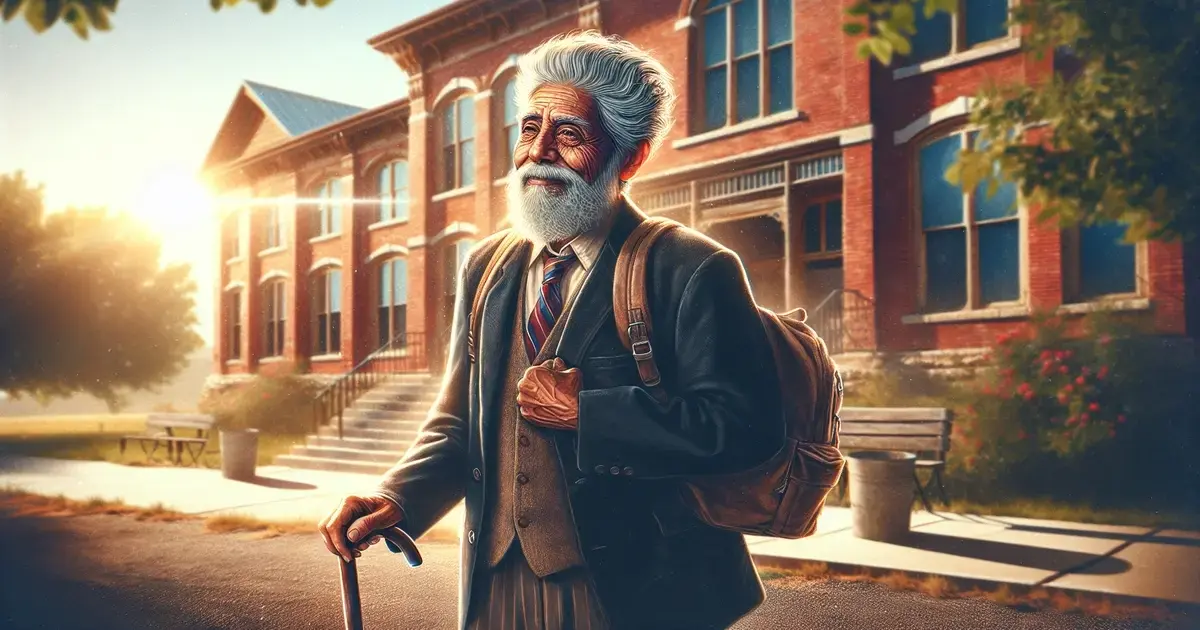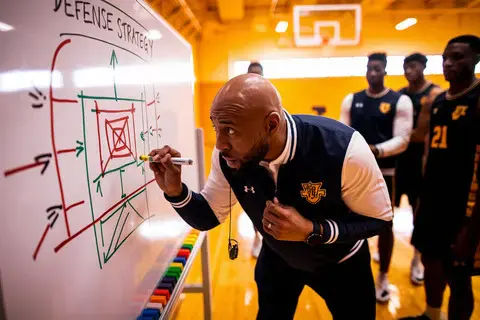Never Stop Learning: Unleash Your True Potential
Unlock your true potential with our comprehensive guide on why you should never stop learning. Discover the importance of continuous growth.

Never stop learning—be flexible and open to new experiences. Whether you are 8 or 80 years old, the pursuit of knowledge is a lifelong journey.
In Morocco, you'll find people of all ages attending classes, participating in workshops, or reading at neighborhood cafés. The life of Marrakech is rooted in a rich culture of exchanging knowledge and storytelling.
From spirited lectures in the medina to teachings passed down in ancestral riads, the city pulses with cultural vibrancy. Learning doesn't always have to be formal or rigid!
Engage in conversation with a neighbor or cook an unfamiliar dish in your kitchen. Most people discover that lifelong education leads to greater opportunity and a more cohesive identity.
Most Chief Program Officers will post simple strategies and share national, or even local, success stories to inspire you to continue learning.
" Turning it into a daily practice, even in small increments, is something that can work with the busiest of schedules and provide consistent movement forward. "
Key Takeaways
- A commitment to continuous education fuels your professional advancement. It's good for your brain and opens the door to a healthier, happier life.
- Figuring out your ideal learning style and creating attainable, bite-sized objectives from the outset will make the process much more pleasant and inviting.
- Turning it into a daily practice, even in small increments, is something that can work with the busiest of schedules and provide consistent movement forward.
- Exploring online courses, podcasts, and digital resources makes it easier than ever to learn new skills at your own pace.
- Finding mentors, peers, and other experts creates a world of motivation, accountability, and new ideas to supercharge your learning journey.
- Keep learning and let us know your thoughts! Think of failures as opportunities—they're foundational to developing resilience and instilling a lifelong learning mentality.

What's In It For You?
Learning is not just a school thing—it goes to the heart of how we live, work, and learn. Embracing a growth mindset and cultivating a robust learning culture can lead to fulfilling work and a strong career. Once you know, you create habits that affect your life permanently. Here's what's in it for you.
Supercharge Your Career Path
Continued education, whether through formal classes or mentorship, is essential to advancing your career. You acquire skills that employers are seeking, which enables you to advance within your organization or secure higher-quality positions.
For example, someone who learns about new tech tools or project management often gets assigned to bigger tasks or receives a raise. As the saying goes, "the more you learn, the more you earn." Even brief courses or workshops can have a tangible impact on your salary and career opportunities.
Keep Your Mind Sharp Always
Continuing to learn is the best way to stay mentally sharp at any age. Studies in cognitive science and psychology prove that learning new things can keep memory strong and help you think faster.
It's not only the content knowledge, though that's important, but it's also about learning how to use your brain to notice patterns, think critically, problem-solve, and maintain attention. Whether you're trying a new language or taking up a hobby, small steps add up and keep your mind fresh.
Live a More Fulfilling Life
Learning a new craft opens up a world of confidence and pride. When you can repair a bicycle, create an elaborate meal, or debate philosophical ideas in another language, it's empowering.
Each new piece of knowledge increases your happiness, pride, and enjoyment of everyday life. This sense of growth invigorates life, bringing new comfort, delight, and joy.
Thrive in a Fast World
The world is moving at an accelerating pace. New tools, trends, and ways of thinking are emerging every day. Continued education is your best defense for staying one step ahead and making the most informed decisions possible.
It enables you to view issues from different perspectives, fostering a more open-minded and well-rounded individual. Even small actions, such as reading one short article per day, accumulate over time.
Related Tips
Your Learning Blueprint
Your learning blueprint should be just that—personal. It grows over time, shaped by both early school days and the everyday learning that happens outside the classroom. From the moment they are born, individuals start learning.
They have to focus and deliberately learn certain things, but other things happen on their own, like learning how to ride a bike or suddenly acquiring a new word. These instances, referred to as implicit learning, demonstrate that development can occur with minimal intention and even without awareness at times.
1. Discover How You Learn Best
Each person has a unique way of learning. Some individuals are auditory learners, others are kinesthetic learners, while many require visual stimulation. Consider how you learned a new language or acquired a new ability.
If you prefer consistency, you may choose a formal in-person or virtual class setting. If you want independence, autodidacticism—self-directed learning—may be more your style. Here in the United States, both paths are equally honored, and the same individual frequently pursues each.
2. Set Small, Smart Goals Now
We all know that big goals can feel daunting. Make them SMART… sort of. Commit to specific tasks—for instance, mastering five new vocabulary words every week or reading one news article per day in English.
These small wins compound to yield significant outcomes while maintaining high morale and motivation.
3. Make Time, Don't Find Time
As we've written before, adults never "find" extra hours in their day to engage in professional learning. Pull out your calendar and block out ten or fifteen minutes each day—perhaps while you sip your morning coffee or commute on the bus.
Over time, these chunks of time yield tangible advancements.
4. Dare to Try New Things
Moving beyond your comfort zone is an excellent way to build confidence and develop skills. Take a cooking class, sign up for a book club, or undertake a new initiative at work.
These new experiences introduce new perspectives and ideas, preventing learning from becoming stale and boring.
5. Use What You Learn Daily
Whatever your experience level, knowledge only stays when it is applied. Tell your family about a new fact during dinner, document what you learned in writing, or implement a new tool in your workplace.
Putting something into real-life practice solidifies new skills.
6. Grow From Honest Feedback
Feedback is helpful because it provides an opportunity to witness what is working and what requires modification or improvement. Request feedback and constructive criticism from a fellow practitioner or trusted friend, or participate in an online community that offers feedback, tips, and advice.
Your growth depends on honest input.

Tap Into Today's Learning Tools
Continuing to learn in the 21st century involves taking full advantage of these new tools and technologies. Whether it is their work, community, or home, people are eager to acquire skills that enhance life on all fronts.
Now that digital tools are ubiquitous, learning is an integral and organic part of life. These tools help people stay up-to-date with changes, whether they work in an office or run a business from home.
Explore Endless Online Courses
Platforms such as Coursera, Udemy, and LinkedIn Learning are gaining traction in the education and training sector. They bring exceptional programming to their community through classes on digital literacy, business, computer science, and even art.
No time to spare. Courses are concise; you can complete one in as little as 30 minutes or have access for a week to complete at your convenience. Many people take them to develop skills necessary for a job, such as learning Excel or enhancing their critical thinking skills.
The lessons are available at your convenience, and you control the pace of learning.
Let AI Be Your Guide
Embracing AI as a tool for learning, AI is here to stay. Chatbots are particularly useful for answering difficult questions.
Personalized learning apps have clear recommendations for your next steps. AI-powered tutors help students break down tough topics, whether it's applying Bayesian inference or learning how to code.
These tools leverage your progress to recommend the following steps, creating a more seamless and personalized learning experience.
Learn On-The-Go: Podcasts & Audio
Podcasts and audiobooks make your wait time your learn time. Whether you're biking through town or running in the early morning, it's pretty easy to find and listen to podcasts that focus on business, personal development, or science.
Shows such as "How I Built This" or "Hidden Brain" allow learning to adapt to the hectic schedules of adults.
Unlock Digital Knowledge Vaults
Digital libraries, wikis, forums, and other social media tools are available 24/7, providing access to information at any time. They provide access to models, research, and best practices from the peer community.
Individuals flock to on-demand platforms to find the best hacks and tricks to gain an edge. This combination of reading and social media sharing contributes to making learning an exciting process.
Busting Common Learning Myths
Learning myths circulate so widely that they begin to seem true. When you dig beneath, many of these notions don't hold up. Unfortunately, many people in Marrakech, and all over the world, are still exposed to that brain myth, the classic canard that humans only use 10% of their brains.
Science says we don't, and never have, and never could— at least not the way Barry Gordon, a neurologist, describes the myth. Let's bust four common myths that hold people back from becoming lifelong learners.
"I'm Too Busy" Is a Trap
No one has enough time in their day. It's not always true that learning has to be in a classroom for several hours a day. Non-formal learning—such as taking an Arabic cooking class in the medina or participating in a Moroccan book club—works well with hectic schedules.
Whether through community-based programs or simply a five-minute conversation with the person next door, developing capacity often ignites new skills and creative thinking. It's not so much about making time as it is about integrating learning into the natural flow of life.
Outsmart Procrastination's Tricks
We've all done it—crammed the night before a big test—but it never really pays off. Research shows that the benefits of cramming aren't worth the stress it causes. Instead, slow and steady learning, such as fun practice or regular exercise, works best.
Even legal apprentices in Morocco are aided by anticipatory socialization, gradually adopting dispositions and tendencies as they progress through the process of becoming lawyers.
Smart Learning Doesn't Cost Much
Innovative learning doesn't have to be expensive. Non-formal alternatives—such as free public lectures or low-cost community workshops—allow you to develop new skills and adopt a lifelong learning approach. Just like dialogic learning through open conversations with friends or elders in the souk, it doesn't cost anything.
Anyone Can Be a Learner
It's a common misconception that learning is only for kids, or only for people with "the right kind of brain." Not true. The left-brain/right-brain myth is the 1980s called, they want their myth back.
Howard Gardner's theory of multiple intelligences illustrates that we all learn in unique ways and have different strengths. With the right encouragement, anyone from Marrakech to Milwaukee can learn a new tongue, art, or trade. It doesn't even matter what their age or professional background is!

The Power of Learning Together
Learning together fosters an environment that influences how individuals learn and grow. Through collaboration, people develop relationships and trust one another. This creates a learning experience that feels less lonely and more like a shared aspiration.
Group settings, whether formal classrooms or casual gatherings in a local café, help people stay engaged and encourage one another to do better. The goal is not simply to learn more. It's not about achieving impressive gains, such as increasing a complex math grade, learning a foreign language, or completing a challenging business scenario.
Find Your Fellow Learners
Having those same curious minds around you can be a game-changer. Because collaborative learning introduces diverse perspectives and solutions, the group has a deeper understanding of the issue.
To illustrate, in Marrakech you may find yourself surrounded by clusters of storytellers, each spinning their interpretation of the same tale from their city's past. People often support one another and come to each other's aid when someone is in trouble.
This collaboration hones communication and critical thinking skills, two key assets in every industry. Research shows that collaborative learning typically yields more successful outcomes and more durable retention of what is learned.
Seek Wisdom from Mentors
Mentors understand the highs and lows of leadership. They light the path for others with their stories, providing practical guidance based on firsthand experience.
In countries where oral tradition is still deeply rooted, such as Morocco, mentors share knowledge that cannot be found in books. They employ techniques such as subgoal labeling, decomposing large projects into smaller, more manageable pieces.
This enables learners to focus and establish a cognitive framework for troubleshooting challenges. The best mentors encourage you to reflect on your experiences and learn from them. They introduce you to ideas from probability, deduction, and even Occam's razor to equip you to approach unfamiliar problems.
Teach Others, Learn More
Teaching is one of the most effective ways for professionals to learn. When you teach new concepts to others, you know more than you realize.
Locals frequently gather to discuss their lessons, teaching one another new perspectives on things. This technique fosters collective intelligence—the knowledge of a group increases as each individual contributes additional knowledge.
Teaching involves using a variety of techniques, such as hands-on practice in the field or real-world examples to apply concepts, which keeps people excited. In collaborative learning, empathy and collaboration flourish, and we all learn more.
Fueling Your Inner Learner
Continued learning has a profound impact on all aspects of life. It is universal, not restricted by age, classroom doors, or the titles we carry. On the one hand, Marrakech is home to an aromatic cultural bazaar that many dream of visiting.
They learn, firsthand, just how rich and layered learning can be. That desire to learn is more than just memorizing information; it encompasses a deeper understanding of the subject matter. It's more about fueling that inner learner, failing fast and learning from mistakes, and incorporating that into everyday life.
What it means to know, to believe, and to learn are all fundamental questions for philosophy, particularly for the branch known as epistemology. This field helps us further understand that learning is not the acquisition of knowledge, but rather the construction of understanding.
Stay Curious, Always Ask Why
Curiosity can make even the most minute subjects exciting. Asking why, just like the epistemologists, tends to hone the thoughts and intellect that they mold. In the souks of Marrakech, each artisan's craft and spice market has a story to share.
When folks ask questions—about weaving, about family recipes, or even street art—they tap into knowledge passed down over generations. This practice cultivates a truly teachable spirit, making the work of learning ongoing and vital.
Mistakes Are Stepping Stones
Growth isn't achieved without a few fumbles along the way. Similar to Thorndike's cats learning through the back-door method, adults acquire real-world, rich knowledge by attempting, erring, and modifying their actions.
This is how informal learning, the majority of adult learning, occurs. Those who remain humble recover faster and make mistakes into powerful stepping stones.
Learning Happens Everywhere, every day.
Suddenly, the streets, cafes, and even daily chores in Marrakech transform into classrooms for dynamic learners. Informal and self-driven learning, such as tinkering, chatting, or problem-solving, fosters a robust learning culture, helping individuals adapt, solve real-world problems, and find purpose in their daily lives.
Seek Understanding, Not Just Facts
Authentic learning goes beyond the surface level of rote fact recall. It is about understanding how things fit together—how Shannon's theory shapes the way we use our phones, or how reinforcement shapes habits.
Those who seek understanding empower themselves as learners, remain open to change, and continue to evolve.

Conclusion
To never stop learning, people in the States discover new methods and approaches daily. Some pick up skills from their neighbors, others swap stories at backyard cookouts, or dive into free online courses after work. In rural communities, residents eagerly seek every tip for growing their vegetables. In the meantime, urbanites still buzz across town sharing hot new podcast recommendations on the metro. Learning is an integral part of everyday life—it doesn't require a large educational campus or significant financial resources. Each lesson, large or small, informs your course of action. So, never stop learning, get curious, speak up, and teach others. That desire to know is what has you on the cutting edge and prepared for whatever comes next. Do you have an idea, suggestion, or would you like to share a story with us? Please feel free to share widely. Your adventure could be the spark that inspires another person's journey.







